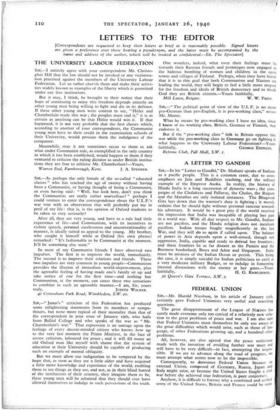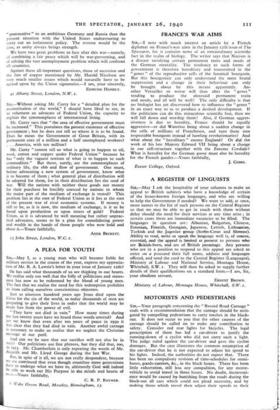FEDERAL UNION
Sm,—Mr. Harold Nicolson, in his article of January rzth, certainly gave Federal Unionists very useful and searching questions.
The great disappointment of the League of Nations has surely made everyone only too cynical of a relatively new solu- tion to the great problems of peace and war. I am also sure that Federal Unionists must themselves be only too aware of the great difficulties which would arise, such as those of lan- guage, of other Federations growing up, and a hundred other problems.
All, however, are also agreed that the peace settlement made with the intention of avoiding further war must and will have to be very• difficult—in fact, attempting the impos- sible. If we are to advance along the road of progress, we must attempt what seems now to be the impossible.
Consequently, to denounce Federal Union because an external Union, composed of Germany, Russia, Japan and Italy might arise, or because the United States fought a civil1 war before she achieved true federation, is pure conjecture. Anyhow, it is difficult to foresee why a combined and unified army of the United States, Britain and France could be more
" provocative " to an ambitious Germany and Russia than the present situation with the United States endeavouring to carry out an isolationist policy. The reverse would be the case, as unity always brings strength.
We have two great problems to face after this war—namely, of combining a fair peace which will be war-preventing, and of solving the vast unemployment problem which will confront all countries.
Against these all-important questions, those of secession and the fate of copper mentioned by Mr. Harold Nicolson are very much smaller issues which would naturally have to be agreed upon by the Union signatories.—I am, your sincerely, EDMUND HAMBLY. 41 Albany Street, London, N.W. z.







































 Previous page
Previous page